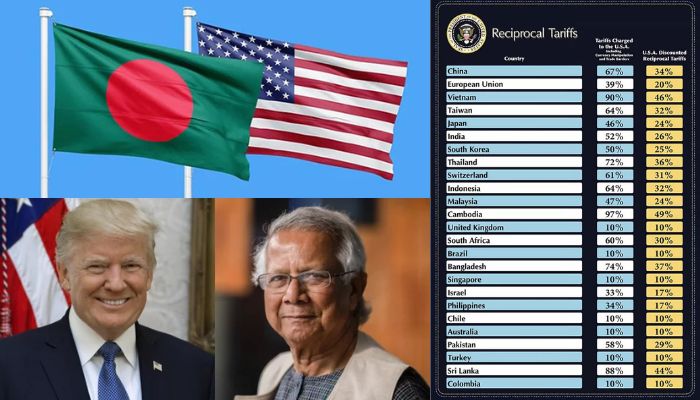
President Trump's second term began on January 20, 2025, and his administration has already imposed major trade changes. From August 1, Bangladesh will face a 35% U.S. tariff on exports, compared to the previous 15% average duty. In some cases, authorities suggested reciprocal tariffs of 37–50% depending on negotiation outcomes [1].
These new "reciprocal tariffs" are tied to U.S. imports from Bangladesh, which are now seen as potential leverage. Bangladesh exported nearly $8.7 billion in 2024–25 to the U.S., mostly ready-made garments [2].
Current Trade Talks: What You Need to Know
Bangladesh and USTR (United States Trade Representative) held two rounds of talks in Washington in early July, but the second round ended without agreement on key points like value-add criteria and strategic conditions [3].
The U.S. proposed a reciprocal duty of 37%, raising the total tariff to 53%—Bangladesh asked to keep it at 26–35% [4].
Bangladesh offered zero tariffs on U.S. agricultural and industrial imports, including wheat, cotton, LNG, and even aircraft, to reduce the trade deficit and build goodwill [5].
80% of negotiation conditions have agreement; around 20% remain unresolved, including restrictions on working with China and value-add certification like 40% local input [3], [6], [7].
Bangladesh has formally requested a short extension to avoid disrupting trade before the August 1 deadline [2].
Risks of Hasty and Unequal Agreements
1. Buying more U.S. goods than necessary (aircraft, LNG, wheat) to win relief—but risking damaging local industries and increasing indebtedness [2].
2. Yielding too many strategic concessions—such as adopting U.S. sanctions on other countries, restricting relations with China, or allowing control over data and infrastructure decisions [8].
3. Failing to involve business voices early—Only in late July did the government ask BGMEA and the private sector to hire lobbyists for U.S. influence, risking delays and weak advocacy [8].
These moves could compromise national sovereignty and economic autonomy if made under pressure or without clear safeguards.
What Bangladesh Should Do Now: A Strategic Roadmap
1. Insist on Reciprocal Tariff Below 35%
Bangladesh should firmly aim for a total U.S. duty of 25–30%, not 37–53%. Clear proposals have been made to cap reciprocal tariff at 10% max, with localized value-add conditions only if accompanied by firm tariff relief [4], [3].
2. Show Mutual Benefit in Import Offers
Offer to import U.S. wheat, cotton, LNG, Boeing aircraft—as Bangladesh has already started doing—not as desperation, but as measured trade reciprocity up to specific volumes and timelines [5], [1], [2].
3. Protect National Interests and Sovereignty
Reject clauses that:
Require Bangladesh to adopt U.S. foreign-policy positions,
Limit trade with China unilaterally,
Make Bangladesh grant exclusive benefits to U.S. goods anti‑competitively [9], [6], [8].
4. Involve Private Sector Early
Embed BGMEA, FICCI, AmCham, and export associations in the negotiation process early. They can hire lobbyists in Washington, build media cases, and speak with U.S. retailers directly [10].
5. Use Remaining Time Wisely
As of July 28, negotiations may still yield results before August 1—Bangladesh must use every hour, with high-level political backing, technical clarity, and clear red lines [10], [11], [2].
Final Message to Policymakers
President Trump imposes tariffs quickly—and speaks only in terms of outcomes, not empathy. He expects deals, not appeals. Bangladesh must:
Stand firm on sovereignty and fair terms,
Speak clearly in U.S. strategic language,
Work fast, with unified public-private coordination.
We must not accept deals that reduce national control or increase dependency. But we can still negotiate a fair, reciprocal agreement that protects jobs, preserves our export market, and builds a durable U.S.–Bangladesh partnership—even under a transactional trade framework.
Bangladesh can win—but only if we negotiate like equals, not supplicants.
References:
1. Reuters. (2025, July 27). Bangladesh orders 25 Boeing planes as part of push to ease US tariffs. Retrieved from [https://www.reuters.com/business/aerospace-defense/bangladesh-orders-25-boeing-planes-part-push-ease-us-tariffs-2025-07-27/](https://www.reuters.com/business/aerospace-defense/bangladesh-orders-25-boeing-planes-part-push-ease-us-tariffs-2025-07-27/)
2. Dhaka Tribune. (2025). Hope rises for tariff relief as Bangladesh-US meeting nears. Retrieved from [https://www.dhakatribune.com/bangladesh/foreign-affairs/387467/hope-rises-for-tariff-relief-as-bangladesh-us](https://www.dhakatribune.com/bangladesh/foreign-affairs/387467/hope-rises-for-tariff-relief-as-bangladesh-us)
3. New Age. (2025). Tariff talks end inconclusive. Retrieved from [https://www.newagebd.net/post/foreign-affairs/269909/tariff-talks-end-inconclusive](https://www.newagebd.net/post/foreign-affairs/269909/tariff-talks-end-inconclusive)
4. The Business Daily. (2025). Bangladesh and United States continue high-level tariff negotiations in Washington. Retrieved from [https://www.thebusinessdaily.net/english/business/news/157](https://www.thebusinessdaily.net/english/business/news/157)
5. The Financial Express. (2025). Dhaka mulls US tariff concessions to boost bilateral trade. Retrieved from [https://thefinancialexpress.com.bd/home/dhaka-mulls-us-tariff-concessions-to-boost-bilateral-trade](https://thefinancialexpress.com.bd/home/dhaka-mulls-us-tariff-concessions-to-boost-bilateral-trade)
6. Prothom Alo English. (2025). Negotiations dragging on over non-trade issues. Retrieved from [https://en.prothomalo.com/amp/story/business/local/i0tgumlpws](https://en.prothomalo.com/amp/story/business/local/i0tgumlpws)
7. Apparel Resources. (2025). Bangladesh Government considers including private sector in US tariff negotiations. Retrieved from [https://apparelresources.com/business-news/trade/bangladesh-government-considers-including-private-sector-us-tariff-negotiations/](https://apparelresources.com/business-news/trade/bangladesh-government-considers-including-private-sector-us-tariff-negotiations/)
8. Prothom Alo English. (2025). US tariff negotiation: Govt turns to the businessmen at the eleventh hour. Retrieved from [https://en.prothomalo.com/amp/story/business/gtdigjn6tx](https://en.prothomalo.com/amp/story/business/gtdigjn6tx)
9. Wikipedia. (n.d.). South Asian Free Trade Area. Retrieved from [https://en.wikipedia.org/wiki/South\_Asian\_Free\_Trade\_Area](https://en.wikipedia.org/wiki/South_Asian_Free_Trade_Area)
10. Bangladesh Pratidin. (2025, July 9). Swift negotiations urged as US tariff hike threatens export edge. Retrieved from [https://en.bd-pratidin.com/economy/2025/07/09/41432](https://en.bd-pratidin.com/economy/2025/07/09/41432)
11. Dhaka Tribune. (2025). Commerce Secretary: Door for US tariff negotiations still open. Retrieved from [https://www.dhakatribune.com/bangladesh/foreign-affairs/385864/commerce-secretary-door-for-us-tariff](https://www.dhakatribune.com/bangladesh/foreign-affairs/385864/commerce-secretary-door-for-us-tarrif.

Editor & Publisher
Dulal Ahmed Chowdhury
www.newsdiplomats.com
The News Diplomats
Cell: +1 (437) 365-4003 & +1 (647) 709-3389
Email: [email protected]
Toronto, Canada.
©২০২৩ সর্বস্বত্ব সংরক্ষিত || The News Diplomats